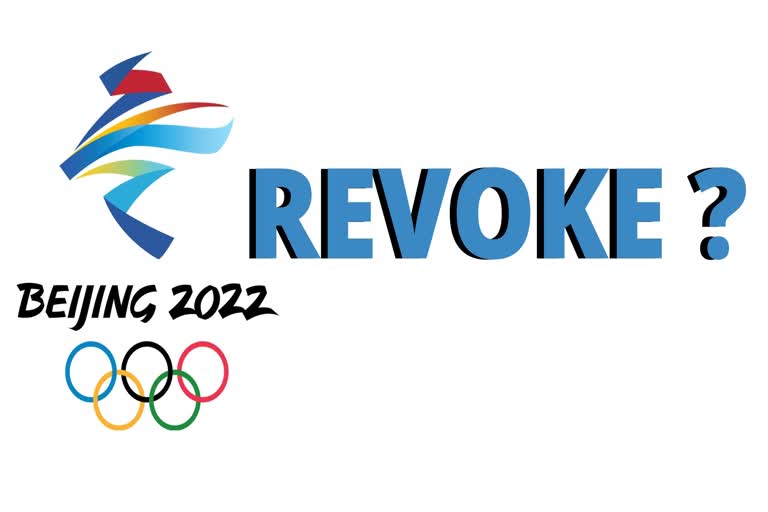Hyderabad: In a major development, more than 160 human rights groups from across the world have signed a petition addressing the International Olympic Committee (IOC) seeking revocation of Beijing's right to host the 2022 Winter Olympics. These groups alleged widespread rights abuses by the Chinese government in several parts of the country and in Hong Kong.
In the petition, addressed to the IOC president Thomas Bach, human rights activists from across the world, alleged that the work of the Chinese Communist Party-led government in Xinjiang, Tibet, Hong Kong and Inner Mongolia showed the country was unsuitable for hosting the Winter Olympic Games.
“The IOC’s reputation was indelibly tarnished by its mistaken belief that the 2008 (Beijing Summer) Olympics would work to improve China’s human rights record. In reality the prestige of hosting the Olympic Games merely emboldened the Chinese government’s actions,” the letter said.
If the event takes place, Beijing will be the only city to host both the Summer and Winter Olympic Games. China didn't lose time to quash their claim as the country's Foreign Ministry spokesperson Zhao Lijian said at a news conference in Beijing on Wednesday that the petition was attempting to “politicize” sports, a move which China “firmly opposes.”
IOC, too, issued a statement in which they made it clear that they don't want to pay any heed to the political issues and said awarding the Olympic Games “does not mean that the IOC agrees with the political structure, social circumstances or human rights standards in its country.”
This claim of IOC came just three years after they said that it would add human rights, anti-corruption and sustainable development clauses to Olympic Host City contracts in the future, beginning with the 2024 Summer Games.
Beijing won the 2022 Winter Olympic Games hosting right in 2015. Calls to boycott the 2022 Winter Olympics have garnered tempo, with the US Democratic presidential candidates asked about whether the US should send a team to the upcoming Games during a debate in December 2019. The 2020 US Democratic presidential nominee Joe Biden refused to answer to this question.
Olympic for image building
In the summer of 2008, China hosted the Olympic Games in Beijing for the first time. The Olympic Games helped China to emerge as a major economical and political superpower in the world. The ruling Chinese Communist Party spent enormous amounts of money and effort to ensure a successful Games. That time too human rights activists raised concerns. Then US President George W Bush also opposed the idea of China hosting 2008 Olympic Games.
Underlining the importance of hosting Olympic Games, Yaqiu Wang, a China researcher with Human Rights Watch, said that holding a prestigious event like the Olympics was a source of “enormous pride” to the Chinese government. “(The 2008 Olympics) gave them a way to legitimize their human rights abuses, it’s like a reputation laundry for Beijing,” she said.
China controlled armed forces controlling public spaces in Hong Kong. In this fresh petition calling for the 2022 Games boycott, Human Rights Watch was not a signatory.
In 2015, Beijing won the hosting rights for the 2022 Winter Olympic Games which will make them the first city to host the Summer and Winter Olympic Games. Kazakhstan's Almaty was also in the contention for the right, but Beijing managed to win the bid. It must be noted that Oslo, Munich and Stockholm pulled out of the contention.
A child raises Free Hong Kong poster during the civil disobedience movement against China. Asked about concerns over human rights issues in both China and Kazakhstan at the time, IOC president Bach said IOC’s role was “to ensure that during the games, and for all the participants, the Olympic charter applies.”
Allegation of gross human right violations
Since 2015, the Chinese government has been facing sharp criticism due to the alleged human rights abuses, especially over its mass detention of Muslim citizens in Xinjiang and the erosion of civil rights in Hong Kong. Several reports claimed that the Chinese government using chemical content to control mass birth among the Uyghurs in Xinjiang.
But the Chinese government defended its policy. It said the camps are “vocational training centres” where Muslim minorities can voluntarily learn life skills and the Chinese language. Global community termed these centres 'concentrations camps'. The United Nations in February demanded 'unfettered access' for media in these camps to examine the daily activities. But the Chinese government rejected the UN plea saying outright 'NO'.
Supporters of China's Muslim Uighurs protest in front of the Chinese consulate in Istanbul last year. (File photo) Meanwhile, anti-China mass movement in Hong Kong witnessed several opposition lawmakers and businessmen facing jail terms.
Although human rights groups made allegations against China, the future of 2022 Beijing Winter Olympics will depend on how IOC respond to this petition and how global political discourse shape against China in the years to come.
